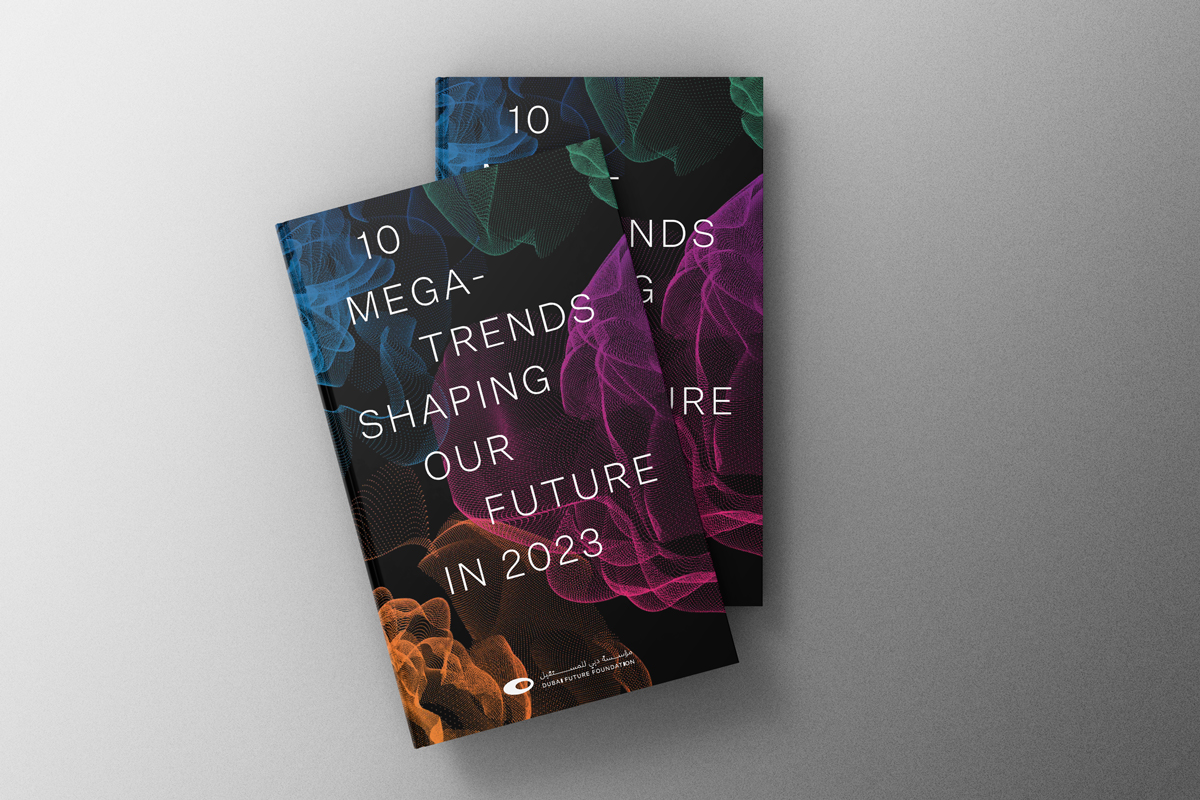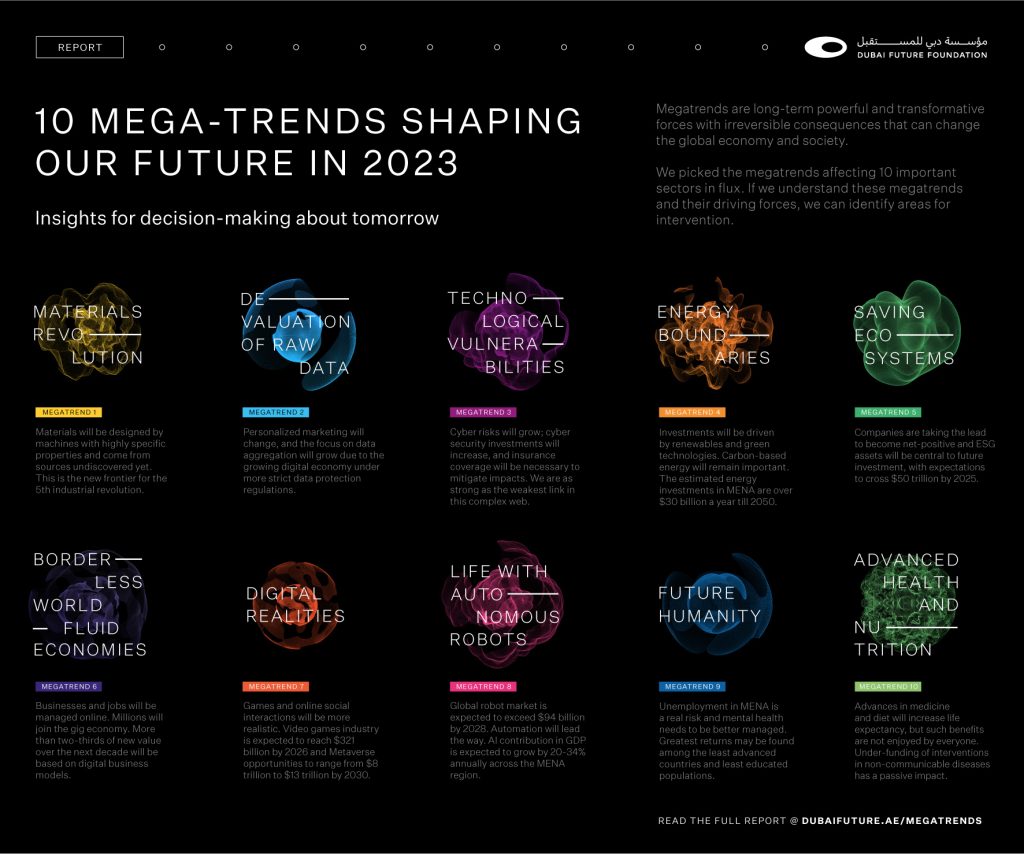
10 Megatrends Shaping Our Future in 2023 report
The Dubai Future Foundation has published a report identifying 10 megatrends that will change economic sectors and society in the coming year.
The report, titled ’10 Megatrends Shaping Our Future in 2023′, is part of a series of forward-looking reports published by the DFF. The latest report highlights various global trends and informs decision-makers and society about current and future challenges in various sectors.
The report looks at major trends related to the economy and society, with a focus on promoting growth, prosperity and well-being. Trends have been identified on the basis of their significance, complexity and relevance.
The material revolution
The report “10 Megatrends Shaping Our Future in 2023” predicts that the world will accelerate the transition from traditional resources to the materials of the future. Emerging digital technologies will be used to create materials with highly specific properties similar to those of natural materials. These new materials could be the new frontier for the Fifth Industrial Revolution.
New materials and industrial raw materials will meet our future needs. They could include sustainable substances for consumer products, smart building materials, synthetic fuels, environmentally friendly batteries, and advances in semiconductors for greater efficiency in solar cell design.
The devaluation of raw data
The proliferation of data will reach the limits of practical application. This process will also be limited by the introduction of data privacy rules. The opportunities will lie in new and more efficient use of existing data applied to new business models. Digital trade in goods and services represents the next frontier of profitable use of data, which will be enhanced by greater sharing of aggregate data across industries and countries, leading to greater economic returns.
Technological vulnerability
The third global trend in the report highlights the need to strengthen digital security and technology infrastructure in light of the increasing number of people and machines connected to the internet. The Cisco report predicts that by 2023 there will be 5.3 billion internet users (two-thirds of the global population) with 3.6 global devices per capita.
Energy frontiers
The International Energy Agency says global energy investment will continue to grow after reaching $2.4 trillion in 2022. Carbon-based energy will remain an important element of the energy mix, but the growth in investment is likely to be driven almost entirely by renewables and decarbonisation technologies.

Saving ecosystems
The report also states that environmental, social and governance (ESG) auditing will continue to grow in importance. Investors, regulators and rating agencies are demanding that large corporations play their part in sustainability. Historically, Europe has been the leader, but Asian and US markets are catching up. Companies are not only working to reduce their carbon footprint, but also to become net positives.
A borderless world is a volatile economy
The covid pandemic has accelerated the trend of super-apps driving commerce, remittances and jobs. This trend is likely to accelerate even further and involve millions of people in a gig economy operating across borders.
Peer-to-peer access-based business models are emerging all over the world. Consumers are increasingly inclined to borrow goods, rent homes or provide micro-skills in exchange for access or money. According to the case study “The Gig Economy – The Economic Backbone of the Future?”, the global gig economy is projected to grow by almost a third to $455 billion in 2023.
Digital reality – immersive virtual and digital spaces
The seventh megatrend relates to the metaworld, games and social interactions on the Internet, which will become more realistic. The gaming industry has become one of the key economic sectors worldwide. Current investment in the meta-universe is in the hundreds of billions, and this is just the beginning. These markets will continue to grow as games and online social interactions become more realistic and tied to product offerings in the virtual world.
Living with autonomous robots
The report’s authors expect increased competition and lower costs to boost robot production and help integrate machines into economic sectors. SMEs are leading the way in this area. According to Global Brain Computer Interface statistics, the adoption of robotics in the manufacturing sector accelerated during the pandemic. It is expected to exceed $94 billion by 2028. The global average density of industrial robots on manufacturing sites will reach an all-time high of 126 robots per 10,000 employees in 2021, up from 66 robots in 2015. According to the Kearney article, there are already 3.5 million industrial robots in operation worldwide.
The future of humanity
The report stresses that human quality of life is the most important motivation for governments to develop education and alleviate problems by offering jobs and promoting mental and physical health. Populations are challenged by education, health, social engagement and population growth. There are solutions to common problems, but strategies need to be reviewed and collaboration promoted to open up opportunities for sustainable social development.
Investment in mental health research is not commensurate with its impact. According to the World Health Organisation’s Mental Health Report, only about $3.7 billion a year is spent on mental health research worldwide. More than half of 56% of all mental health funding goes to basic research rather than clinical or applied research.
Improved health and nutrition
The report stresses that water and food security, as well as health, will remain common drivers for strengthening global collaboration and deployment of technologies to support societies. Investing $18 billion a year in all low- and middle-income countries could generate $2.7 trillion in economic benefits by 2030, according to the World Health Organization.
Global health spending – both public and private – will grow at a rate of 3.9% between 2020 and 2024, reaching $10 trillion by 2024, according to Healthcare Radius. However, one in three people in the world still lacks access to safe drinking water and 3 billion people do not have the means to wash their hands, according to the World Economic Forum. In 2022, 50 million people in 45 countries are on the brink of hunger, and $24.5 billion is needed to reach 153 million people, according to the World Food Programme.
.@DubaiFuture Foundation releases "10 Mega Trends Shaping 2023", a report highlighting the 10 trends transforming economies and societies in the upcoming year. It's part of DFF's ongoing series of forward-looking reports.https://t.co/VjzcrVWLAe pic.twitter.com/ifdRWhoVli
— Dubai Media Office (@DXBMediaOffice) January 31, 2023
Follow our Telegram Chanel








